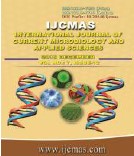


 National Academy of Agricultural Sciences (NAAS)
National Academy of Agricultural Sciences (NAAS)

|
PRINT ISSN : 2319-7692
Online ISSN : 2319-7706 Issues : 12 per year Publisher : Excellent Publishers Email : editorijcmas@gmail.com / submit@ijcmas.com Editor-in-chief: Dr.M.Prakash Index Copernicus ICV 2018: 95.39 NAAS RATING 2020: 5.38 |
The study was conducted in rural and urban area of Hisar district. Four Government Senior Secondary Schools, two from rural area and two from Hisar city were selected at random. Total sample constituted of 240 adolescents in the age group of 16-18 years, 120 from rural area and 120 from urban area, representing both the sexes in equal number. Self-prepared interview schedule was used to collect information on personal and socio-economic variables. Family environment was assessed by Family Environment Scale (FES) by Bhatia and Chadha (1993). Youth Problem Inventory (YPI) developed and standardized by Verma (2004) was used to assess the adolescents' psycho-social problems. Correlations, ANOVA and regression analyses were used to analyze the data. Majority of fathers had education up to senior secondary level, while majority of mothers had education up to middle school level. Maximum number of adolescents belonged to lower income group followed by middle and high income groups. Results revealed that different aspects of family environment and overall family environment, except conflict, were significantly negatively correlated with different aspects of youth problems and total score of youth problems. Conflict in family was positively correlated with youth problems. Adolescents who perceived family environment as low, i.e., poor experienced more problems than those who perceived family environment as average and high. Regression analysis revealed that overall family environment and personal growth dimension of family environment were significant predictors of psycho-social problems among adolescents. Findings of the present study have implications for adolescents, their parents and other caregivers.
 |
 |
 |
 |
 |